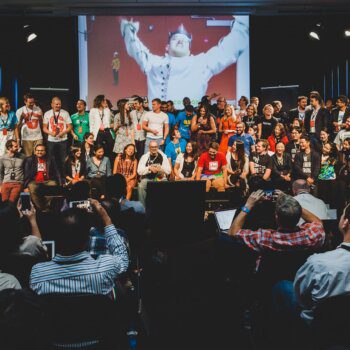After another punishing year dominated by COVID, the omicron threat appears to be receding and many people may now be looking at the beginning of the end of the pandemic. But the fallout from COVID will still pose huge challenges in 2022 in terms of economic growth, supply chain issues, labour shortages and employee confidence.
As ever, effective leadership in business is paramount. But strong leaders need to be thinking beyond the pandemic. So how do they navigate a future filled with uncertainty? Here are the five core skills which all leaders facing these challenges must demonstrate and embody.
1. Have a vision
The pandemic has caused the unprecedented disruption of commerce in most industry sectors. Envisioning involves creating a picture of what the future will be like for an organisation and which will serve as a road map to success. When that vision is understood and shared, it generates enthusiasm and motivation, and builds the confidence in employees. Good leaders cultivate not just a plan of how the vision may be achieved but also a deep conviction that it will be successful.
When COVID-19 emerged, Mark Aslett, CEO of aerospace and defence company Mercury Systems, had been tracking the virus for several months and had a clear vision for how his organisation could address the emerging challenges. His three-fold plan was to protect the health, safety and livelihoods of Mercury’s employees, reduce operational financial risks to the business and deliver its commitment to customers and shareholders.
Aslett communicated this clearly in a way that resonated with employees, customers and shareholders alike. The success of his vision has been reflected in the strong financial performancedemonstrated throughout the pandemic, leaving the company poised for further success in the year ahead.
2. Adapt and be open to change
Good leaders develop appropriate strategies for their organisations in periods of crisis or stability alike, anticipating and being open to change. Starbucks CEO Kevin Johnson did just that when faced with a public backlash following the arrest of two black men waiting for a friend in a Philadelphia branch. Because they hadn’t purchased anything, the manager allegedly deemed the two men to be suspicious and called the police.
The arrest caused public outrage. Johnson not only apologised but closed 8,000 US stores while 175,000 employees underwent training in unconscious racial bias. This kind of policy change is important in inspiring and motivating employees while reassuring customers and helping to restore the company’s reputation.
3. Generate new ideas
The uncertainty of a volatile business environment experiencing everything from environmental pressures to supply chain problems means innovation and creativity will be key in 2022. The ability to question the way things are done, challenge assumptions and generate new ideas is vital in good leaders.
This means creating an environment that fosters innovation among the workforce. Employees should be encouraged to challenge the status quo and look at alternatives to traditional perspectives and problem solving.
Leaders need to make teams think about existing challenges in new ways and re-examine assumptions about their roles. This could involve more creative thinking and idea generation through useful tools such as mind-mapping, brainstorming and gamification.
4. Solve problems creatively
In 2022 there is likely to be a variety of social, economic, environmental and technological problems affecting businesses. Labour shortages are expected to be an issue of concern as COVID self-isolation continues and some people are hesitant to rejoin the workforce.
Supply chain issues that were evident throughout 2020 and 2021 may not be resolved. Companies will need to consider how much of their supply chain should be international versus domestic in an effort to address environmental issues, future production and supply chain problems.
Solutions will be found by analysing the root cause of the problems with employees at the centre of the process. Communication is key. Good leaders recognise the value of their teams’ input and motivate people to work together to solve thorny problems. Most importantly, listening carefully to customers’ needs and concerns is also crucial.
Reacting to pandemic challenges such as falling demand accelerated shipping company Maersk’s shift from being a port-to-port transport operation to an integrated logistics company. Maersk’s speeded-up transformation capitalised on digital technologies to enhance its expertise and provide customers with better, faster and more integrated supply chain information.

5. Inspire and motivate
After almost two years of pandemic conditions, the fallout from COVID for the coming year includes workspace concerns, low employee morale and burnout. People need inspirational leaders at the helm to unite the workforce and reinvigorate the workplace. In motivating people, empathy is critical. Effective leaders need to understand the fears, hopes and concerns of those who work for them.
Working separately and often in isolation has taken its toll on some people, demonstrated in the rise in mental health issuesacross the population. Some workers may now prefer the work from home arrangements, and leaders will need to look at continuing flexibility while balancing the needs of the business.
Compassionate and supportive leadership is vital in inspiring confidence in employees and reassuring them in difficult and uncertain times. Concerted efforts to support and maintain employee wellbeing is crucial to morale and achieving company goals.





























